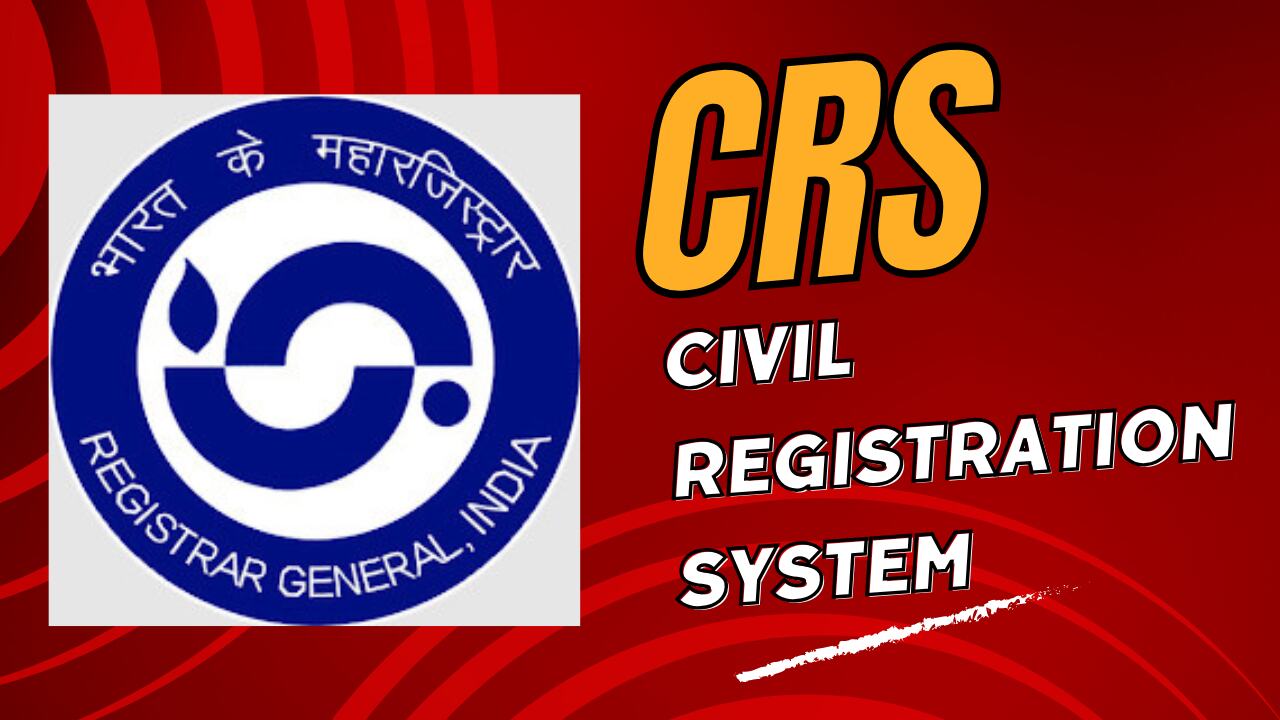Civil Registration System in India: The Civil Registration System (CRS) in India is a unified framework mandated by the government to record vital events such as births, deaths, and marriages.
This systematic recording is crucial for various administrative and legal purposes. In this article, we will explore the significance of the CRS, the process of registering vital events, and answers to commonly asked questions.
Importance of the Civil Registration System The CRS plays an essential role in:
- Legal Proof: Providing official documentation for births, deaths, and marriages.
- Statistical Data: Contributing to demographic data that aids in policy-making and planning.
- Government Benefits: Ensuring access to various government schemes and services.

Civil Registration System in India
The Civil Registration System (CRS) in India is a process where important events like births, deaths, and stillbirths are officially recorded. This system is permanent, continuous, and mandatory.
Purpose
The main goal of the CRS is to provide accurate data for government planning and policy-making. The information collected helps the government create policies based on real data about the population.
Registration of Events
Under the Registration of Births and Deaths Act (RBD Act) of 1969, registering births, deaths, and stillbirths is required by law. These events are recorded where they happen, and typically, they should be reported within 21 days.
Coordination
The Registrar General of India (RGI) oversees the entire registration process across the country. However, the actual implementation of the CRS is managed by state governments.
Benefits
The CRS is important for government planning. It also helps citizens, as birth and death certificates are often needed to access various government services and benefits.
Strengths
The CRS in India is strong in areas like infrastructure, coverage, data completeness, and overall management, making it an effective system for gathering vital statistics.
| Main Point | Details |
| Importance of CRS | – Legal Proof: Provides official documentation for births, deaths, and marriages. |
| – Statistical Data: Aids in demographic data collection for policy-making and planning. | |
| – Government Benefits: Helps access government schemes and services. | |
| How to Register Vital Events | Birth Registration: |
| – Hospital Births: Registered by medical institutions, and a certificate is provided. | |
| – Home Births: Reported by head of household or authorized person to the local registrar within 21 days. | |
| Death Registration: | |
| – Hospital Deaths: Reported by hospital, and a death certificate is issued. | |
| – Home Deaths: Reported by the nearest relative or head of household to the local registrar. | |
| Marriage Registration: | |
| – Registered under Hindu Marriage Act, 1955, or Special Marriage Act, 1954. Involves application, documents, and appearance before registrar. | |
| Frequently Asked Questions | Documents Required for Birth Registration: Proof of birth (hospital), identification of parents, residence certificate. |
| Late Registration: Yes, with additional documentation and a nominal late fee. | |
| Processing Time: Typically a few days to a couple of weeks, depending on workload. | |
| Fee for Registration: Varies by state and type of registration; nominal fees for basic registration, additional charges for late registration. | |
| Conclusion | CRS ensures legal documentation for vital events, aids in government data collection, and helps citizens secure rights and benefits. |
How to Register Vital Events in India?
Birth Registration
- Hospital Births: Medical institutions are responsible for registering the birth and providing a certificate.
- Home Births: The head of the household or an authorized person must report the birth to the local registrar within 21 days.
Death Registration
- Hospital Deaths: The hospital will report the death to the registrar and provide a death certificate.
- Home Deaths: The nearest relative or head of the household must report the death to the local registrar.
Marriage Registration
- Couples can register their marriage under the Hindu Marriage Act, 1955, or the Special Marriage Act, 1954, depending on their religion and preferences.
- The registration process generally involves filling out the application form, submitting required documents, and appearing before the registrar.
Related also: How to Apply for MCD Birth Certificate Online | Step-by-Step Process, Fees, and FAQs
Frequently Asked Questions (FAQs)
Q: What documents are required for birth registration?
A: Typically, you’ll need proof of birth from the hospital, identification documents of parents, and a residence certificate.
Q: Can late registration be done?
A: Yes, but it involves additional documentation and sometimes a nominal late fee.
Q: How long does it take to get the certificates?
A: The processing time usually ranges from a few days to a couple of weeks, depending on the registrar’s office workload.
Q: Is there a fee for registering for these events?
A: The fee structure varies by state and the type of registration. Basic registrations often have nominal fees, while late registrations may incur additional charges.
Conclusion
The Civil Registration System in India ensures that every vital event is legally recorded and certified. This system not only provides individuals with essential legal documents but also helps the government maintain accurate demographic data.
By understanding the registration process for births, deaths, and marriages, citizens can easily comply with legal requirements and secure their rights and benefits.
